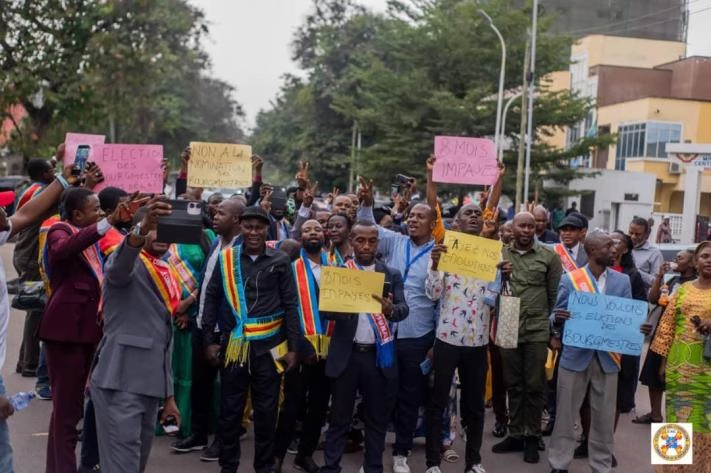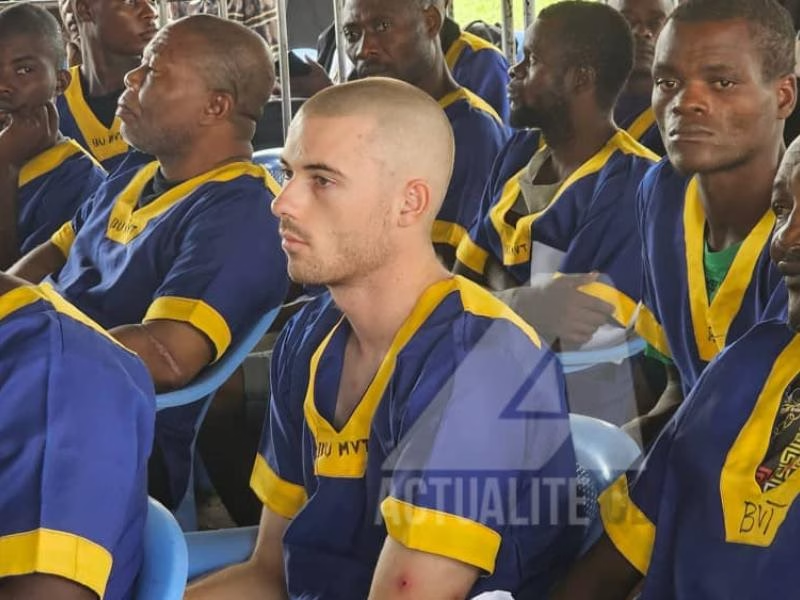Terms of Reference for Consultancy Services for developing Oxfam in DRC- Country Strategy 2025 – 2027
OVERVIEW
Title Consultancy for development of Oxfam Country Strategy (OCS) for 2025 – 2027 Oxfam Country Program DRC Objectives of the Assignment Review of the OCS ending on 31 March 2025 and development of the OCS for 2025-2027. Location of assignment DRC (Kinshasa with visit to at least 5 field bases) Dates of the assignment March – June 2025 Type of consultant Vat registered Company Deadline to receive offers 15th February 2025
Background and Context in the country
The Democratic Republic of the Congo (DRC) remains one of the most complex and protracted humanitarian crises in the world, affected by several humanitarian impacts that includes population movements, acute food insecurity, acute malnutrition, epidemics, governance crisis and protection issues. Up to now, armed conflict and natural disasters caused massive population movements and protection incidents in an overall context of poor access to quality basic social services, weak social protection and development policies and deep gender inequalities.
In 2024, more than 25.4 million people – a quarter of the population – required assistance, with the most urgent humanitarian needs concentrated in the eastern provinces, severely hit by violence and insecurity. More than 9.6 million people were on the move in DRC, including 6.5 million internally displaced persons, 2.6 million returnees and 527,000 refugees, making the displacement crisis in the country one of the largest in the world and second only to Sudan.
Epidemics are significantly spread, particularly cholera with 50,000 suspected cases and 470 deaths recorded in 2023 – the worst situation since 2017. Measles transmission more than doubled in 2024, exceeding 320,000 cases (versus 146,000 in 2023), while deaths caused by measles tripled, from 1,800 in 2022 to over 6,000 in 2024.
Climate shocks are worsening vulnerable people’s living conditions, with heavy rains and river flooding affecting some 2.1 million Congolese and leaving 300 others dead, just between mid-January 2024 and December 2024.
Introduction: Oxfam’s Commitment
Oxfam works with people across regions, from local to global, on transformative changes. Oxfam’s work is grounded in the commitment to the universality of human rights. Driven by diversity, evidence and experience, we fight inequality to end poverty and injustice globally. “Oxfam is committed to reducing vulnerabilities to humanitarian crisis building on existing resilience and development initiatives, ensuring the right to life and development after a crisis and providing the support needed to quickly recover and re-establish lives, regain dignity and opportunities.
Oxfam’s vision: Is a just and sustainable world and our mission in DRC as a humanitarian and development organization is to strengthen civic space and peoples’ rights, response and resilience to end all forms of inequalities and social injustices, informed by a decolonial feminist lens rooted in the Global South.
Oxfam’s Humanitarian Goal: aims to minimize and relieve the suffering of people affected by humanitarian crises, save lives, and increase community resilience to future disasters either caused by nature and or by human action. We respond to chronic, slow, and rapid onset crises at the same time responding to chronic developmental issues.
Oxfam’s organisational values guide our work, behaviours, and culture:
Empowermen t: We acknowledge and seek to expand people’s agency over their lives and the decisions that impact them.
t: We acknowledge and seek to expand people’s agency over their lives and the decisions that impact them. Inclusiveness : We embrace diversity and difference and value the perspectives and contributions of all people and communities in their fight against poverty and injustice.
: We embrace diversity and difference and value the perspectives and contributions of all people and communities in their fight against poverty and injustice. Equality : We believe on fair treatment of everyone and all people across the globe to have the same rights and opportunities.
: We believe on fair treatment of everyone and all people across the globe to have the same rights and opportunities. Accountability : We account for our actions and inaction and hold ourselves accountable to the people we work with and for.
: We account for our actions and inaction and hold ourselves accountable to the people we work with and for. Solidarity : We join hands, support each other, and collaborate across boundaries to work towards a just and sustainable world.
: We join hands, support each other, and collaborate across boundaries to work towards a just and sustainable world. Courage: We speak the truth to power and act with principle on the justice of our causes.
Oxfam in DRC is Requesting for Proposals from experienced and committed consultant/s to review the existing Country Strategy ending in March 2025 and develop the new strategy for 2025-2027. This process is being contracted to facilitate the DRC Country Office to effectively develop its Country Strategy (OCS) for country wide consultation for a collective OCS. The OCS development process will be consultative, systematic, and engaged. This strategy development will inform the direction Oxfam in DRC will take looking at improvements, adaptations, contextual changes internal and external for the purposes of strengthening the Country Office programming, management and internal structural systems fitting into 2025-2027 goal.
In addition a review of the current OCS will help identify needs, opportunities and gaps to enable Oxfam in DRC to develop an OCS ‘fit for the purpose and mandate’ and ‘fit for global strategic framework’. The main purpose we are developing the strategy is to fit within Oxfam ambitions, OIA strategy and global strategic framework.
The expiring OCS is based on shifting caseloads, where Oxfam will meet the needs of population across the country through integrated economic justice, gender justice, governance – considering our focus on WASH, EFSL, governance and protection fostering development and resilience in OCS target geographical areas. This had made it possible for Oxfam to meet the shifting needs of displaced people with a timely response during the critical stages of the emergency and following up returnees for resilience and development projects.
Coordination of a range of interventions – social protection work, Cash transfers, WASH interventions, livelihoods support – cash transfers, in humanitarian response.
Other important aspects of Oxfam’s humanitarian work in the DRC are 1) integrating safe programming and conflict sensitiveness in ongoing and new programmes, 2) strengthening systems approach in advancing local humanitarian leadership (LHL) and applications in WASH and social protection, 3) Rights in Crises (RiC) advocacy, and 4) integration of conflict transformation frameworks and engagement with other actors.
In view of the above and in line with the DRC’s HRP strategic approach for 2025, Oxfam DRC aims to play an important role in linking Relief interventions with Early Recovery as families are assisted to recover and adjust to new circumstances through of 3 to 24 months integrated programmes interventions.
Oxfam has 6 field bases that is Mbandaka, Dekese, Bukavu, Goma, Beni and Mahagi and two flexible/roving teams covering North Kivu and South Kivu emergency interventions.
Objectives of the consultancy
To develop in a collaborative manner the OCS of Oxfam in the DR Congo. This includes developing the context analysis – political, socio-economic, climate change, localization of humanitarian leadership etc and identify the humanitarian and development trends in the DRC in collaboration with Oxfam team members, external and local partners, and other key informants.
To collectively reflect, assess and document the strengths, weakness, opportunities, and threats of Oxfam’s ongoing humanitarian and development program in DRC (SWAT) drawing on country evidence bases and learnings. This will help inform the next stage of Country program planning and areas for interventions in the country.
Listen, strengthen and respect Oxfam processes and systems and voice of the people, local partners to co-create the kind of the organization they want to see and be part of.
To use the information from primary, secondary sources as well as learning from various engagements with external and internal key informants including workshop to write up and finalize the Oxfam in DRC country strategy.
Recommend a road map of change management to improve our efficiency, effectiveness and ways of working looking at systems, policies and procedures.
Scope of work
Based on technical inputs from external and internal key informants and ideas outlined in the previous OCS, propose a final OCS document that is acceptable to the Country Program team.
Align the OCS with the OIA strategy based on the country context and the current Humanitarian Response Plan.
Coordinate with different technical teams to get comprehensive analysis of the context, the existing programs and propose areas of focusing interventions and the integrated approach.
Support the country team to organize and to facilitate a workshop on validation of the OCS.
Maintain the OCS master draft and finalize the strategy following the validation workshop that includes participants from the OiA platform.
Expected Deliverables
Inception Report: A document outlining the consultant’s understanding of the assignment, proposed methodology, design principles, key stakeholders to be engaged, and a detailed timeline for deliverables.
A SWOT analysis of the current OCS is done – Review Report: A 5-page review report of the current OCS, including strengths and weaknesses backed by a comprehensive analysis of the programming system in DRC.
A validation workshop is conducted, and an outcome report is made available.
Stakeholder Engagement Summary: A report summarizing feedback and insights gathered from interviews and focus groups with key stakeholders, including Country team, EA Node and OI Regional Platform.
Assessment of alignment with the OiA strategy, plan/ strategic priorities.
OCS final document (maximum 20 pages)
Timeline
The expected duration of the process is three months, starting from the date of signing the contract (approximatively beginning of March 2025). The consultant will work closely with the Country Director, Country Management Team, Humanitarian Program Manager, Thematic Leads, Program Managers/Field Coordinators, and other relevant stakeholders to ensure timely completion of the deliverables.
Deliverables Timeframe (deadline) % Payment Inception report – design the process and overall OCS development plan submitted 15th February Selection and Consultant engagement based on the submitted bids 1st March 2025 Coordination with CD and HR desk review of documents 2nd March 2025 40% of the budget A review team (EA, OIA, staff representatives (proposed criteria: CMT Field based staff, UN agencies like OCHA, FONGI) (Desk review and SWOT) 15th March 2025 Consultant will implement the designed process and overall OCS development plan 15th March – 15th May 2025 Finalization of reports and 1st Draft of OCS Strategy 15th May 2025 Validation workshop 30th May 2025 Consultant will produce the final report on review of COM with implementation plan as per agreed outputs. 20th June 2025 60% of total budget of consultancy
Methodology
The methodology will be proposed by the consultant.
The consultant will prepare an inception report prior to the commencement of the developing the assignment. The inception report will present the proposed methodology that will be used for the purpose of having conducting desk study, collecting data and proposed timetable for the entire process.
Deadlines
Author(s): mediacongo.net
Source: Access the article


